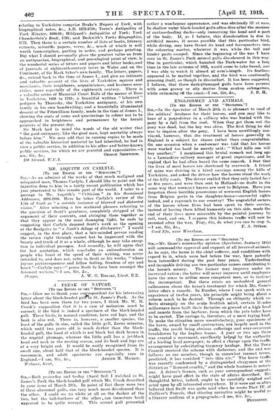(To THE EDITOR OP THE " SPECTATOR.") Sue—Mr. Gene's noteworthy
opinion (Spectator, January 1111() will commensithe approval-and support of all loversof. animals. As he says, the home is the chief sufferer, end conditions with regard to it, which were bad before the war, have patently been intensified during the past four years. 'Underfeeding and incapable driving are two particular 'causes contributing to the horse's misery. The former may improve under an increased ration; the latter will never• improve until employers have the sense to utilise more competent men, or to iustruet the iucompetent. But there exists an undoubted general callousness about the horse's treatment for which Mr. Gene's letter offers a remedy. In Dundee, where I can speak with an experience of twelve years, his principle might bring about a reform much to be desired. Through an obliquity which re- flects strangely on the acute Scottish mind, certain Deudee millowners have bent their factories on ground at a. high level and remote from the harbour, from -which the jute bales have to be carted. The cartage is, therefore, of a most trying kind. To make the situation more unsatisfactory, poor specimens of the horse, owned by small contractors, are largely used in the traffic, the result being obvious sufferings and ever-recurrent breakdowns by the hapless teams. A year or two ago there was created a movement, excellently helpul by the authority of a leading local newspaper, to effect a change upon the traffic arrangement by substituting tramway haulage. But the Town Council received the scheme with disfavour, and the end was failure; as one member, though in somewhat inexact terms, predicted, it has vanished "into thin air." The horse traffic was recently condemned by a distinguished clergyman of the district as " licensed cruelty," and the whole business is notori- ous. A driver's -licence, such as your• correspondent snggest:. might have good effect in the state of affairs described. His thoughtful letter, indeed, ought to be carefully -weighed arm acted upon by all interested everywhere. If itwere net so often believed that Swift was quite mad when he wrote Part IV. of Gulliver's Travels, that stirring narrative might he- useful as a literary medium of a propagsmda.—I am, Sir, de.,
DMOVIAN.



































 Previous page
Previous page